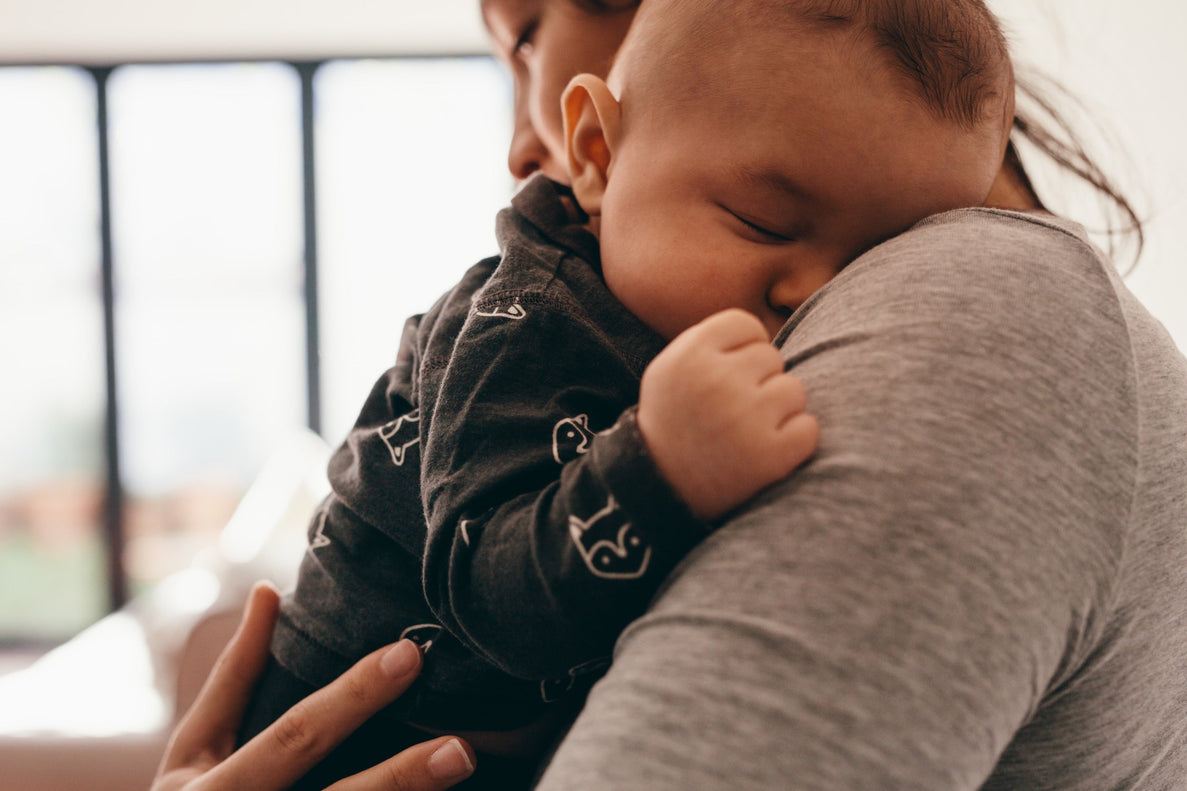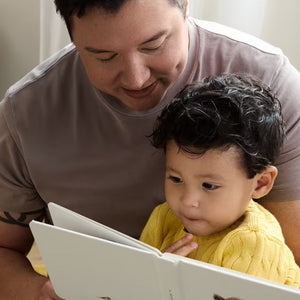You’ve probably heard someone say "never wake a sleeping baby." But is that really what’s best? Let’s talk about why and when you would want to wake your sleeping baby.
When should I wake a sleeping baby?
I understand that you might be hesitant to wake your baby when they’re peacefully sleeping. However, sometimes waking a baby from a nap or in the morning helps set them up for overall sleep success, helps ensure they get the calories they need, and helps accommodate real life. Here are some of the specific times that it’s best to wake a sleeping baby:
1. It’s time for a daytime feeding.
If it's been longer than 3-3.5 hours since the start of the last feeding, it’s time to wake your baby and offer a feeding. Getting adequate nutrition and calories during the day will help babies and toddlers sleep better at night.
2. It’s time for their nap to end.
If your baby is taking two or more naps, we aren’t going to let any one nap go longer than two hours, and we want to pay attention to total daytime sleep. If your toddler is taking only one nap, we aren’t going to let them nap longer than 3 hours. Capping naps allows your little one to get the active awake time they need to fill their Tired Tank™.
3. It’s time to start the day.
Most little ones need their daytime to be about 12-13 hours long. A good rule of thumb is to start your day no later than 8:00 am (or 12-12.5 hours after bedtime). This ensures they get enough active awake time during the day and protects a healthy bedtime.
4. Your work schedule requires that they wake at a certain time.
Some families have to leave the house by a certain time each morning and simply have to wake their little one to get to work on time. This is a necessary part of life! Do your best to follow age appropriate wake windows throughout the rest of your day. If your little one is at daycare, trust that they can handle the daytime, and you can manage the wake window before bedtime.
5. You’re trying to adjust your day to accommodate an activity or appointment.
Sometimes, an activity or appointment, like library storytime, a doctor’s appointment, or picking up a sibling from school, will fall during your baby's typical nap time during the day. You may need to wake your baby earlier than usual in the morning to fit in that nap, or even wake your baby early from a nap to make it to your appointment.
6. You arrived home or to your final destination, and your little one is asleep in the car seat.
We never want to leave a baby sleeping in the car seat outside of the car. While you're shopping, if your eyes are on your baby and your baby remains safely buckled, it's okay for baby to be sleeping in the car seat. But once you arrive home or to your destination, always take your baby out of the car seat.
7. You’re trying to preserve a 7:00-8:00 pm bedtime.
We know that most babies do best with a bedtime between 7:00-8:00 pm. In order to preserve bedtime and overnight sleep, we want the last nap of the day to end by:

Text version of When to end the last nap of the day
| Age Range | Time |
|---|---|
| 3-4 months | 6:00 pm |
| 5-7 months | 5:30 pm |
| 7-10 months | 5:00 pm |
| 11-14 months | 4:00 pm |
| 14 months and older | 3:30 pm |
Can babies sleep too much?
Typically, babies don’t sleep more than they need to over the course of a 24 hour period. However, they can sleep too much during the day to sleep well at night. Getting too much daytime sleep often leads to bedtime struggles, interrupted night sleep, or early mornings. In order to protect overnight sleep, we typically want to keep total daytime sleep under:

Text version of Daytime sleep totals to protect overnight sleep
| Age range | Total daytime sleep |
|---|---|
| 3-4 months | 5 hours |
| 5-7 months | 4 hours |
| 7-10 months | 3.5 hours |
| 11-14 months | 3 hours |
| 14- 24 months | 3 hours |
Please know that little ones may be sleepier when they’re experiencing a growth spurt, developmental progression, or illness. This is okay. Your baby’s body is asking for what it needs. BUT, if your baby is much sleepier than normal, difficult to wake, or seems lethargic, I want you to talk with your doctor.
Expert Tip: Newborns can be pretty sleepy, especially if they are experiencing day-night confusion. Check out my tips below for more insight into sleepy newborns. Again, please speak with your baby’s pediatrician if you have any concerns.
My newborn doesn’t want to eat, just sleep all day. What can I do?
There are a few reasons you might see a newborn baby who doesn’t seem interested in eating during the day:
-
If your newborn seems to sleep all day and be awake all night, we want to focus on correcting day-night confusion.
-
If your newborn always seems to be drifting off during those important daytime feedings, let’s talk about how to help your sleepy eater.
-
If your newborn seems to be waking every hour or two throughout the night to eat, we may need to correct your newborn’s reverse cycling and really target full feedings during the day.
Please check with your pediatrician if you have any concerns about your baby’s overall intake or if they seem lethargic and very hard to wake.
How do I wake up a newborn?
Here are a few ways you can wake your newborn during the day:

If you consistently struggle to wake your newborn or your newborn rarely seems alert and active, please contact your pediatrician.
How long should newborn naps be?
There really isn’t a “should be” when it comes to newborn naps. It’s completely normal (and developmentally appropriate) for naps to be anywhere between 20-120 minutes during those first few months.
If your newborn is still sleeping at 2 hours, I would encourage you to wake them in order to make sure your baby is getting the full feedings and active awake time they need. If you feel like you’re constantly seeing short naps with your newborn, be sure to pay attention to your newborn’s sleepy cues and wake windows to set them up for the best chance of nap success.
Should I wake my newborn to feed them at night?
It depends. If your doctor says you need to wake your baby for night feedings, please do! For babies who are staying on their growth curve, you can typically allow one longer stretch of sleep in the night. That one stretch shouldn’t go longer than their age in weeks plus one. (ie. If your baby is 4 weeks old, we would allow them to sleep until 5 hours after the start of their last feeding before waking them.)
Expert Tip: If your baby isn’t getting a long stretch of sleep in the night, don’t be alarmed. There are 3 reasons you might not be seeing this longer stretch: your baby simply isn’t developmentally ready, you need help with your sleep strategies, or your baby needs more practice. If you’re not sure where to begin with your sleep strategies, please know that I can help: my Newborn Sleep Bundle will walk you step-by-step through a no-cry approach to laying a solid sleep foundation with your newborn.
When can I stop waking my baby to feed during the night?
Most doctors will agree that if your baby is eating full feedings every 2.5-3.5 hours all day long, gaining weight steadily, and staying along their growth curve, you can allow them to sleep longer and longer stretches at night. For full-term babies, this means they can typically sleep a maximum of their age-in-weeks +1 at night before they will need to wake for a feeding.
For example, a 3 week old would need to wake and eat after 4 hours (from the start of their last feeding) in the night. Likewise, a 6 week old can have a maximum 7-hour stretch (from the start of the last feeding to the start of the next feeding) in the night. If they don't wake on their own, go ahead and wake them for a feeding.
This means that by 10-11 weeks, babies who are eating full feedings every 2.5 - 3.5 hours all day long, showing steady weight gain, and staying on their growth curve can sleep 11-12 hours at night without needing you to wake them for a feeding. If your baby is waking on their own and showing hunger cues, offer a feeding, but if not, most doctors will agree that you don't need to wake them.
Want a plan to help your little one get longer and longer stretches of sleep in the night during those first few months? My First Five Month Bundle is a no-cry approach that is appropriate for both breastfed and bottle-fed babies. We will gradually, ever-so-gently, work toward longer stretches of night sleep.
Understand this: Not all babies will be able to sleep through the night without a feeding by 10-12 weeks. We must be responsive to their cues and make adjustments based on their individual needs. Some little ones will still need feedings in the night for 9-12 months, but can still get consolidated sleep before and after those night feeding(s). Be sure to talk to your pediatrician about any specific night-feeding questions for your baby.
If you’re thinking about weaning night feedings (or if you’ve decided it’s best to maintain a feeding in the night), I can help. The 5–24 Month Collection will help you create a gentle and gradual approach to weaning night feedings and reaching your sleep goals
Should I wake my baby to change their diaper?
Not usually. But if your baby is suffering from a severe diaper rash or another skin issue in their diaper area, you will most likely need to wake them to change their diaper overnight. If your baby wakes in the night for a feeding (or any other reason) and their diaper is soaked or soiled, that’s the perfect time to change them. Check out my tips for nighttime diaper changes.
Please speak with your pediatrician if you have any concerns about whether you need to wake your baby for diaper changes overnight.
Should I wake my baby up from a long nap? Should I wake my toddler up from a long nap?
For babies taking two or more naps, we don’t want any single nap to exceed 2 hours. If your baby or toddler takes only one nap a day, we’ll want to limit the nap to 3 hours. Capping your little one’s naps supports good sleep by:
-
Allowing for active awake time.
-
Providing time for adequate feedings during the day.
-
Helping maintain a bedtime between 7:00-8:00 pm.
If naps are a struggle, I can help. For babies 5-24 months, my Conquering Naps class will teach you how to get the restorative naps your little one needs. For toddlers 2-4 years, my Toddler Sleep Training class will give you the tools you need for nap time success.
Should I wake my sick baby from a nap?
Sleep is vital for getting well. When your baby or toddler is sick, you can let naps and night sleep go a bit longer than usual. Consider waking your little one if it has been longer than 2.5-3 hours for any given nap or it’s about an hour later than their normal wake time in the morning. This helps maintain adequate hydration and nutrition and sets your baby up for that important restorative night sleep.
You may notice that your baby or toddler wakes more frequently during naps and nights when they’re sick. Check out the blog Baby Sleep and Sick Season for more help.
Should I wake my baby up in the morning?
Most little ones need their daytime to be about 12-13 hours long. A good rule of thumb is to start your day no later than 8:00 am (or 12-12.5 hours after bedtime). This ensures they get enough active awake time during the day and protects a healthy bedtime.
If this kind of consolidated sleep sounds like a dream, I have classes that can help whether you have a newborn (0-4 months), baby (5-24 months), or toddler (2-4 years). I’ll show you how to set your days and nights up for success using a holistic approach that allows you to be emotionally connected to your little one.







